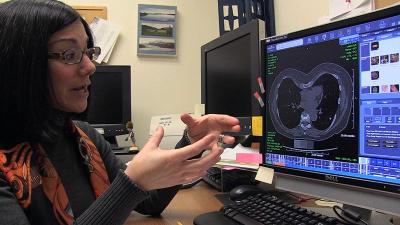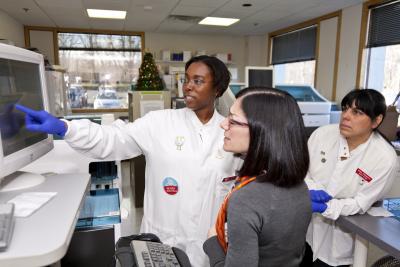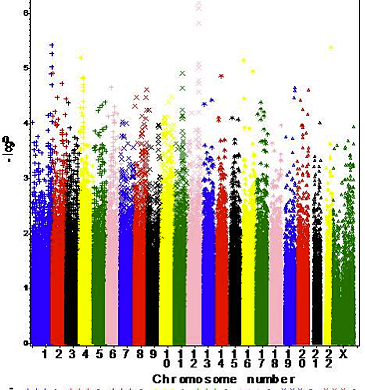Research into the Realm of Risk
Caroline Fox investigates risk factors associated with cardiovascular disease.


Examining pericardial fat deposits on a CT scan
For Caroline Fox, M.D., M.P.H., a clinical endocrinologist, there is no better environment in which to work than as part of the now-famous Framingham Heart Study (FHS), where the phrase “risk factor” was first coined more than five decades ago.
Since its inception in 1948, the landmark study involving residents of the town of Framingham, Massachusetts has committed to identifying risk factors that contribute to cardiovascular disease (CVD). Researchers began by recruiting an original cohort of 5,209 men and women between the ages of 30 and 62, and, since then, more than 9,000 individuals have participated in the study.

Lab members review data from a Framingham Heart Study sub-group analysis
As a medical researcher, Fox has a deep desire to understand why common diseases such as obesity, diabetes, and chronic kidney disease are so inextricably linked to heart disease. “Risk factors are conditions or habits that make someone more likely to develop a disease, or increase the chances that an existing disease will get worse,” explains Fox. “To understand risk factors, we need to study large populations, and this is where the FHS is unique: with three generations of families participating, we have access to 60 years of longitudinal data that, for someone who studies risk, provides a gold mine of information.”

Fox and Clinic Manager Emily Manders prepare a patient examination room
Information gleaned from the FHS includes both biological specimens and data—the building blocks of Fox’s research. “Our goal is to understand how genetics influence risk factors, and that means lots of collaborative research, including epidemiology, biomarker research, genomics, and even imaging studies,” says Fox. She and her two postdoctoral fellows interact with a number of other researchers, statisticians, and international consortia.
“Obesity has long been recognized as a risk factor for CVD, but, remarkably, fat deposits in different parts of the body are known to confer different risks,” says Fox. Using computed tomography (CT) scans to map the fat distribution of individuals, her group has begun identifying genes specifically involved in different areas of body fat distribution. “We’re aiming to understand the relationship between these fat deposits and CVD risk factors,” says Fox. The uniquely longitudinal aspect of the FHS allows assessment of fat distribution in the same individuals over a period of seven years, enabling researchers to observe changes in fat deposits over time that might be associated with changes in heart disease risk, a correlation that could have a profound effect on public health policy and medical interventions.

A Manhattan plot for chronic kidney disease (CKD) from the Framingham Heart Study
While obesity is a relatively well-known risk factor for CVD, Fox’s other research area, chronic kidney disease (CKD), is not. “Chronic kidney disease is still vastly under-recognized and underdiagnosed,” says Fox. “Patients rarely know they have it until the disease is quite advanced.” Despite the fact that CKD affects more than 10 percent of the U.S. population over the age of 20, it is largely considered a “silent disease,” due to its lack of initial symptoms. In the early stages of CKD, treatments are available to slow down or halt progression, but options become more limited in later stages, with dialysis or kidney transplant often the last remaining solutions. Cardiovascular disease is the major cause of death for all people with CKD, yet the scientific community still knows very little about its basic biology.

Fox continues to investigate the link between heart disease and other common diseases, such as obesity, diabetes, and CKD
Fox is a passionate advocate for driving CKD research forward. Her collaborative approach has successfully uncovered dozens of genetic loci for CKD, while laying the groundwork for identifying more heritable components in the near future. With the incidence of CKD on the rise, Fox is redoubling her efforts. “In many ways CKD research is one to two decades behind fields such as cardiology,” says Fox, “so there’s an enormous amount of work to be done in understanding the basic genetics of the disease, the underlying biology, and the risk factors associated with it.”
Caroline Fox, M.D., M.P.H., is a principal investigator in the Center for Populations Studies at the National Heart, Lung, and Blood Institute (NHLBI) and Associate Clinical Professor of Medicine at Harvard Medical School.
This page was last updated on Wednesday, May 24, 2023